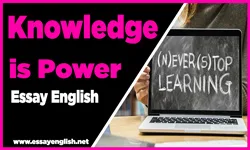essay on knowledge is power
Power may be defined as authority or control over others. Power has always been sought by individuals and nations. In fact, history can be largely explained in terms of the struggles of individuals, groups and nations to obtain power and the inevitable conflicts between them.
Power has been popularly thought to be military or administrative. When we think of powerful persons we generally think of kings, ministers, dictators, high officials and so forth. Powerful nations are associated with huge armies and destructive armaments. It is not commonly realised that knowledge is an important form of power and is very often the secret behind power in the popular sense.
 |
| essay-on-knowledge-is-power |
This is especially so in the modern world where most of the skills are highly technical and possessed by a few. Now-a-days military power is largely dependent upon scientific knowledge. America emerged as the most powerful country after the Second World War, because its scientists, by incessant experimentation, succeeded in splitting the atom and making atom bombs. Russia and China could not afford to lag behind in the arms race.
They too soon learnt how to produce these deadly weapons. A nation cannot become strong today by increasing the size of its army and stockpiling of conventional weapons. It needs an army of scientists and technicians. In a sense, the most powerful people today are the scientists. If a scientist invents a new weapon of enormous destructive power, the country for which he works will be stronger to that extent.
Other kinds of knowledge, too, confer, a sort of power on those who possess them. Eminent doctors and highly skilled surgeons have the power to save people from death. It is a power greater than the power of kings and officials. Poets, novelists, and artists can exercise a far-reaching influence on the public mind. The books of writers like Rousseau and Marx have sparked off revolutions.
The editors of newspapers shape public opinion. But, by and large, the power wielded by writers is not immediately perceptible and bears fruit in the long run. Of the same kind is the influence of eminent teachers and educationists They possess the power to mould the ways of thinking and living of entire generations.

